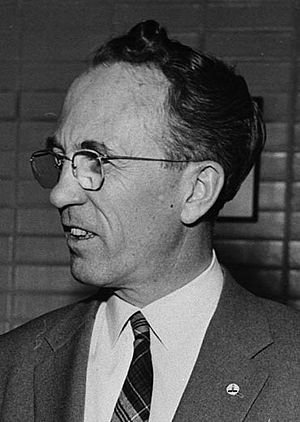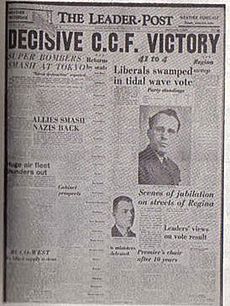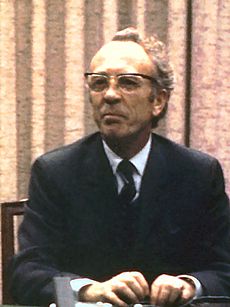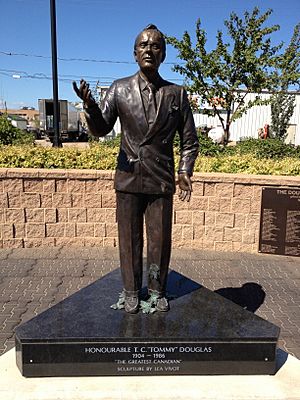Tommy Douglas facts for kids
Quick facts for kids
Tommy Douglas
|
|
|---|---|

Douglas in 1955
|
|
| Leader of the New Democratic Party | |
| In office 3 August 1961 – 24 April 1971 |
|
| Preceded by | Hazen Argue (as leader of the CCF) |
| Succeeded by | David Lewis |
| 7th Premier of Saskatchewan | |
| In office 10 July 1944 – 7 November 1961 |
|
| Monarch | George VI Elizabeth II |
| Lieutenant Governor | Archibald Peter McNab Thomas Miller Reginald J. M. Parker John M. Uhrich William J. Patterson Frank Lindsay Bastedo |
| Preceded by | William John Patterson |
| Succeeded by | Woodrow Lloyd |
| Member of the Canadian Parliament | |
| In office 10 February 1969 – 22 May 1979 |
|
| Preceded by | Colin Cameron |
| Succeeded by | Riding dissolved |
| Constituency | Nanaimo—Cowichan—The Islands |
| In office 22 October 1962 – 25 June 1968 |
|
| Preceded by | Erhart Regier |
| Succeeded by | Riding dissolved |
| Constituency | Burnaby—Coquitlam |
| In office 14 October 1935 – 15 June 1944 |
|
| Preceded by | Edward James Young |
| Succeeded by | Eric Bowness McKay |
| Constituency | Weyburn |
| Member of the Legislative Assembly of Saskatchewan for Weyburn | |
| In office 15 June 1944 – 7 November 1961 |
|
| Preceded by | George Crane |
| Succeeded by | Junior Staveley |
| Personal details | |
| Born |
Thomas Clement Douglas
20 October 1904 Camelon, Falkirk, Scotland |
| Died | 24 February 1986 (aged 81) Ottawa, Ontario, Canada |
| Resting place | Beechwood Cemetery, Ottawa |
| Political party | CCF (1935–1961) NDP (1961–1986) |
| Spouse |
Irma Dempsey
(m. 1930) |
| Children | Shirley Douglas Joan Douglas Tulchinsky |
| Relatives |
|
| Alma mater |
|
| Profession | Baptist minister |
| Signature | |
Thomas Clement Douglas (October 20, 1904 – February 24, 1986) was a famous Canadian politician. He was the seventh Premier of Saskatchewan from 1944 to 1961. He also led the New Democratic Party (NDP) from 1961 to 1971.
Douglas was a Baptist minister before he entered politics. He was first elected to the House of Commons of Canada in 1935. He was a member of the Co-operative Commonwealth Federation (CCF). Later, he became the Premier of Saskatchewan. His government created North America's first universal health care program. This means everyone could get medical care, no matter how much money they had.
After his time as Premier, Douglas became the first leader of the federal New Democratic Party (NDP). He never became Prime Minister, but his party often had a lot of power in the government. He was known for speaking out against the War Measures Act during the 1970 October Crisis. He retired from politics in 1979.
Douglas received many awards. In 2004, a TV show called him "The Greatest Canadian" after a country-wide vote.
Contents
Early Life
Thomas Clement Douglas was born in 1904 in Camelon, Scotland. His family moved to Winnipeg, Canada, in 1910. Before leaving Scotland, Douglas hurt his right knee. He got a serious infection called Osteomyelitis. Doctors in Winnipeg said his leg might need to be removed. However, a special surgeon offered to treat him for free. This experience made Douglas believe that healthcare should be free for everyone. He later said, "No boy should have to depend either for his leg or his life upon the ability of his parents to raise enough money."
During World War I, his family went back to Scotland. They returned to Winnipeg in 1918. Douglas saw the Winnipeg general strike. He watched police use clubs and guns against strikers. This event made him want to protect people's freedoms later in life.
When he was 15, Douglas started amateur boxing. He won the 1922 Lightweight Championship of Manitoba. In 1930, Douglas married Irma Dempsey. They had a daughter, Shirley, who became an actress. They also adopted another daughter, Joan. His grandson is the actor Kiefer Sutherland.
His Education
Douglas started school in Winnipeg and finished in Glasgow. He left high school at 13 to work in a cork factory. The owner offered to pay for him to learn languages to become a cork buyer. But his family moved back to Winnipeg. Douglas then worked as a Linotype operator. He later decided to go back to school to become a minister.
College Studies
In 1924, Douglas went to Brandon College, a Baptist school. He studied theology and was influenced by the Social Gospel movement. This movement combined Christian ideas with social change. Douglas learned that Christianity was also about seeking social justice. He studied socialism and Greek philosophy. He was a top student and a champion debater.
Douglas paid for college by leading church services in small towns. He often preached about social reform and helping the poor. He said the Bible could be used to talk about "building a society and building institutions that would uplift mankind." He also earned money by giving entertaining speeches.
University Research
Douglas earned his Master's degree in sociology in 1933. He later studied at the University of Chicago. He saw many homeless people during the Great Depression. He was upset that some political groups just talked about revolution instead of helping people. This made him believe in taking action to solve problems.
From Minister to Politician
After college, Douglas became a minister at Calvary Baptist Church in Weyburn, Saskatchewan. The Great Depression was happening, and Douglas became a social activist. He joined the new Co-operative Commonwealth Federation (CCF) political party. In 1935, he was elected to the House of Commons of Canada.
When World War II began, Douglas supported Canada joining the war against Hitler. He even tried to join the army, but his old leg injury stopped him.
Premier of Saskatchewan
In 1942, Douglas became the leader of the Saskatchewan CCF. In 1944, he led the CCF to a big victory in the provincial election. They won 47 out of 52 seats. This made Saskatchewan the first place in North America with a social democratic government. Douglas was Premier for 17 years.
His government made many important changes, including:
- Creating the publicly owned Saskatchewan Power Corporation to bring electricity to farms and villages.
- Starting Canada's first public car insurance service, the Saskatchewan Government Insurance Office.
- Creating many crown corporations (government-owned businesses).
- Passing laws that allowed public service workers to form unions.
- Starting a program to offer taxpayer-funded hospital care to all citizens. This was the first in North America.
- Passing the Saskatchewan Bill of Rights. This law protected basic freedoms and equality for everyone. It was passed before the Universal Declaration of Human Rights by the United Nations.
Douglas was the first leader in Canada to ask for a constitutional bill of rights. This idea later led to the Canadian Charter of Rights and Freedoms in 1982.
Thanks to a strong economy and good financial planning, Douglas's government paid off the province's debt. This helped make his most famous achievement possible: universal health care.
The Birth of Medicare
Douglas's main goal was to create Medicare. He started with hospital insurance and slowly moved towards full universal healthcare. In 1961, his government passed the law for universal medical insurance.
In 1962, doctors in Saskatchewan went on strike. They worried about losing money and government control. But Douglas's plan eventually went ahead. Douglas stepped down as Premier to lead the new federal NDP party. His successor, Woodrow Lloyd, launched the full Medicare program in 1962.
The success of Saskatchewan's healthcare program inspired the rest of Canada. In 1964, a national study recommended that all of Canada adopt Saskatchewan's healthcare model. In 1966, the federal government created a national public health care program. So, Medicare across Canada was the work of Tommy Douglas and other important politicians.
Federal NDP Leader
Becoming Leader
In 1958, the CCF party lost many seats. They needed a big change. Many people wanted Douglas to lead the new party. In 1961, Douglas became the first leader of the New Democratic Party of Canada (NDP).
In the House of Commons
Douglas left provincial politics and tried to get elected to the federal House of Commons in 1962. He lost that election but was later elected in a special election in Burnaby—Coquitlam, British Columbia. He served as a Member of Parliament until he retired in 1979.
The NDP did better under Douglas than the CCF had. Douglas was respected by many Canadians. His party had a lot of influence during the 1960s.
The War Measures Act
In October 1970, there was a crisis in Quebec. The government used the War Measures Act. This law gave police and the military huge powers and limited people's freedoms. Douglas and his fellow NDP Member of Parliament, David Lewis, were strongly against it. They were almost the only politicians to vote against it.
Douglas said the government was "using a sledgehammer to crack a peanut." Years later, many politicians who voted for the Act said they regretted it. They praised Douglas and Lewis for their courage.
Later Life and Retirement
Douglas stepped down as NDP leader in 1971. He continued to serve as a Member of Parliament until 1979. He then joined the board of directors for an oil company.
Douglas received many honorary degrees from universities. In 1981, he was appointed to the Order of Canada, which is a very high honour. In 1985, he received the Saskatchewan Order of Merit.
In 1984, Douglas was hit by a bus but recovered quickly. He died of cancer in 1986 at age 81. He is buried in Beechwood Cemetery in Ottawa.
In 2004, Canadians voted him "The Greatest Canadian" in a national TV contest.
Tributes
Douglas Provincial Park in Saskatchewan is named after him. A statue called The Greatest Canadian was put up in his hometown of Weyburn in 2010. His grandson, Kiefer Sutherland, helped unveil it.
Many schools and buildings are named after him, including:
- Tommy Douglas Collegiate in Saskatoon.
- A library in Burnaby, British Columbia.
- A student housing co-op in Toronto.
- Tommy Douglas Secondary School in Vaughan, Ontario.
- The Tommy Douglas Center in Silver Spring, Maryland, USA.
In 2019, a plaque was put up in Regina, Saskatchewan, calling Douglas the "Father of Medicare."
Artistic Depiction
Tommy Douglas has been shown in movies and TV shows:
- In the CBC mini-series Trudeau, he was played by Eric Peterson.
- In the mini-series Prairie Giant: The Tommy Douglas Story, he was played by Michael Therriault.
- He was also the subject of a 1986 documentary called Tommy Douglas: Keeper of the Flame.
- He was mentioned in the Michael Moore documentary Sicko, which compared healthcare systems.
Famous Stories
Douglas was known for telling fables to explain his ideas.
- "The Cream Separator" was a story he wrote. It explained how the rich get the most, while workers get very little.
- He also told the fable of "Mouseland". This story compared voters to mice who keep electing cats (politicians from other parties) instead of electing their own kind (politicians who truly represent them). His grandson, Kiefer Sutherland, later narrated an animated video of the "Mouseland" speech.
Images for kids
See also
 In Spanish: Tommy Douglas para niños
In Spanish: Tommy Douglas para niños




